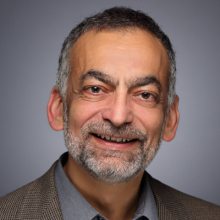Série de Séminaires de Recherche Telfer - Samer Faraj
Lost in Space: The Interplay between Focal and Subsidiary Coordinating Following a Space Change (en anglais)

***Étudiantes et étudiants à la maîtrise en gestion avec thèse - ces événements peuvent compter parmi les six séminaires de recherche auxquels vous devez assister (MGT 6191/ MGT 6991 / MHS 6991)(4 séminaires pour les étudiantes et étudiants à la maîtrise en gestion avec projet).***
Samer Faraj, PhD
(en anglais seulement)
Research on coordination has traditionally focused on social and procedural arrangements that align collective action, yet this perspective often overlooks the embodied, pre-reflective processes that underpin effective coordinating. We draw on the distinction between focal and subsidiary coordinating, to argue that focal coordinating—deliberate efforts to structure workflows and align tasks—depends on subsidiary coordinating, which consists of taken-for-granted, backgrounded embodied actions that support joint work. Through an ethnographic study of a neonatal intensive care unit (NICU) relocation, we find that space change required iterative embodied repairs that targeted subsidiary coordinating, ultimately reenabling focal coordinating. These repairs involved the reconfiguring of sensory access, inscribing new bodily habits, reallocating who-senses-what and reorienting intercorporeal action. Our findings contribute to theories of coordinating and space by showing how spatial disruptions cannot be fully addressed through social or procedural adjustments alone but must involve the reconstruction of embodied subsidiary coordinating.
À propos du conférencier
(en anglais seulement)
Samer Faraj is professor at McGill University’s Desautels Faculty of Management, holder of the Canada Research Chair in Technology, Innovation and Organizing, an associate member of the McGill Department of the Social Studies of Medicine, head of the research group on Complex Collaboration and has served

